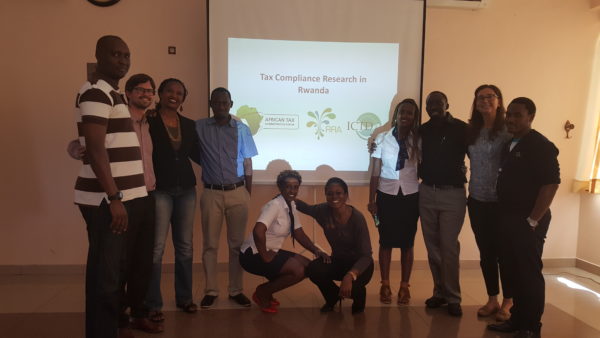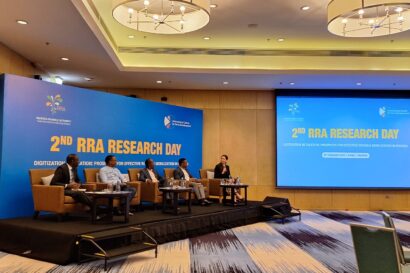The most reliable way for revenue authorities to find out how to improve tax compliance is to conduct large scale research experiments. The first such experiment on the African continent was conducted in Rwanda as a collaboration between the Rwanda Revenue Authority (RRA), the ICTD and the African Tax Administration Forum (ATAF). The experiment generated important research findings and helped raise an additional $9 million USD in tax revenue.
Study and Pilot Experiment: Revelations about Compliance and Actual Progressivity
Before beginning the experiment, the researchers used the RRA’s administrative data to conduct a comprehensive analysis of the Rwandan tax system, including quantifying audit probabilities, compliance gaps, and tax burdens, for which there were previously little evidence. They found that Rwanda’s tax revenue is highly reliant on large taxpayers located in Kigali, and that many taxpayers declare non-positive income; they also found evidence that noncompliance is substantial. By calculating effective tax rates, the researchers also found that the tax system is less progressive in practice than it appears on paper. This is because many small taxpayers choose to remain in the ‘lump sum’ regime, which is much simpler to comply with, rather than join the more complex ‘real’ regime that would tax them based on their level of profit.
The research team then designed a pilot experiment to gather some initial insights on tax compliance and to test the process of message delivery. The pilot sought to examine the effect of an information letter on whether taxpayers would voluntarily correct their tax declarations. The experiment used a sample of 2,000 taxpayers, stratified by size, location, and risk of evasion and avoidance. The sample was randomly assigned to the treatment group (which received a letter) or control group (no letter). The letters, written in English, French, and Kinyarwanda, offered taxpayers information about Rwandan tax law, which provides for sanctions of up to 60 per cent if underreported income is discovered through an audit, but much lower (about 10 per cent) if taxpayers voluntarily revise their declarations. Almost 600 personalised letters were successfully hand-delivered by RRA staff to taxpayers in the treatment group.

The letters were found to be effective in increasing voluntary compliance, reducing negative revisions (a way to avoid or evade taxes) and increasing the likelihood of positive revisions. This was especially the case for small taxpayers, who were more than five times more likely to revise their declarations than the small taxpayers in the control group; when they did, their revisions were more than 200 per cent higher than the control group revisions. This experiment demonstrated that information letters can be an effective way to increase compliance by encouraging taxpayers to declare previously unreported income. The pilot also uncovered some practical issues in implementing this type of study in the African context, which led to innovations within the RRA. For example, the RRA adopted systems to automatically personalise messages to taxpayers, and fully digitised the process of letter preparation.
The Large-scale Experiment: Discovering Which Messages Work Best
Building on the lessons learned from the pilot, the larger experiment sought to evaluate the effectiveness of different messages and delivery methods in increasing compliance. The team used nine treatments, testing three different messages and delivery methods. They tested a deterrence message (emphasising sanctions and penalties for non-compliance), a benefits message (illustrating how tax payments are used to pay for public services), and a reminder (simply informing taxpayers of the deadline). These were sent in both English and Kinyarwanda, either by letter, email, or SMS. Over 13,000 taxpayers were involved in this study, with over 11,000 messages sent in total.
The experiment’s findings challenged some existing literature by showing that deterrence does not seem to be the most effective way to achieve compliance increases in Rwanda. While small taxpayers were still quite responsive to deterrence messages, their contribution to the public purse is relatively small, and in general, Rwandan taxpayers responded more to friendly messages, either gentle reminders of deadlines or information related to the importance of tax revenues to finance public services. The experiment also demonstrated the efficacy of non-traditional channels of communication, such as emails and SMS messages, in achieving substantial increases in declared taxes. The effectiveness of these cheaper channels, as well as non-deterrence strategies, is good news for low-income countries where limited financial and human resources constrains enforcement efforts. This is clearly evidenced by the fact that the experiment generated US$9 million in additional revenue for the RRA.
Through the process of conducting the experiments, the team identified some areas where improvement of administrative processes would make this type of intervention more efficient and scalable in the future. For example, the project catalysed more efficient solutions for keeping taxpayer contact information up to date and automatically personalising communications. The project also prompted the RRA to expand the functionality of its SMS platform.
Improving Systems and Building Capacity
In addition, collaborating with the ICTD and ATAF helped build research capacity within the RRA. This was partly through hands-on work in running the experiment, as well as training workshops organised through the collaboration on experimental design and proposal writing. The ICTD also provided training on the use of statistical software. Further, the RRA’s Research and Planning Department wrote a companion paper, fully authored by RRA staff, which provides a more in-depth look at taxpayers’ reactions to the messages they received as part of the experiment.
The RRA and ICTD are continuing to collaborate based on a memorandum of understanding that will facilitate further joint research and capacity building activities. New research is already underway on the VAT and evaluating the effectiveness of taxpayer education programs.



